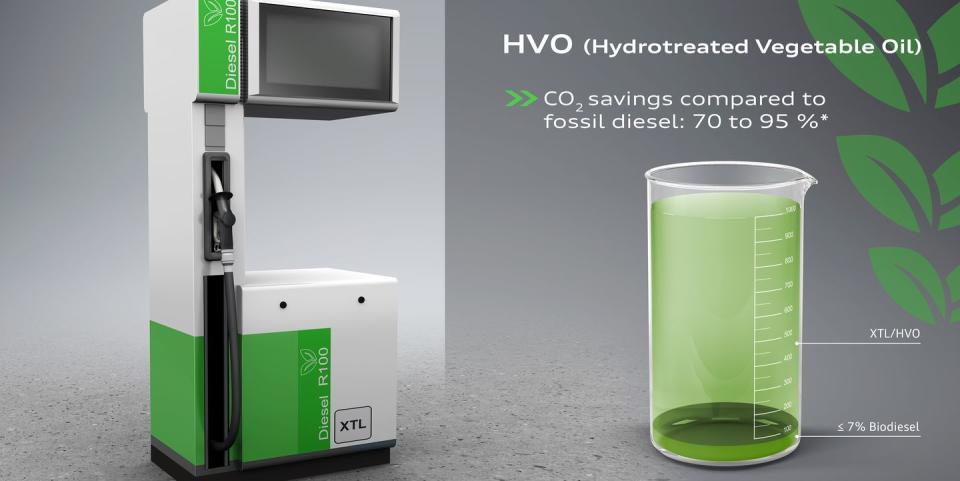New Audi Diesel Engines Can Now Run On a Renewable Fuel

Audi has approved a number of new V6 and four-cylinder diesel engines to run on hydrotreated vegetable oil (HVO), derived from residues and waste materials from agriculture and the food industry.
The fuel is promised to offer carbon-dioxide reductions of between 70% and 95% compared to regular diesel.
Only relatively new Audi models will be officially cleared to run on HVO, which is mostly available in Scandinavian countries at the moment.
The Volkswagen diesel crisis may have largely closed the door for many of the group's vehicles in North America, but the same is not true for the rest of the world, where sales of diesel vehicles are still active and are expected to remain so for many years.
Even as the Volkswagen Group pursues a rapid electrification strategy among its brands, the automaker continues working to make existing diesel models more sustainable, as part of its goal to achieve net climate neutrality by the year 2050.
A few days ago Audi revealed it has approved many of its new V6 diesel models to accept renewable fuel, in this case hydrotreated vegetable oil (HVO). The automaker says the sustainable fuel enables carbon-dioxide reductions of between 70% and 95% compared to diesel based on fossil fuel, while the fuel's much higher cetane rating also allows for cleaner combustion compared to fossil diesel.
"As the cetane rating of HVO is around 30% higher, the combustibility of the engines is enhanced. The positive effects of this are particularly noticeable when cold starting. We tested the effects on various components, the performance, and exhaust emissions in specific validation runs before granting approval," said Matthias Schober, head of powertrain development for V-TFSI, TDI, and PHEV at Audi.
HVO fuel is made from residual and waste materials, including residues from agriculture and cooking oil obtained from the food industry. Through a process of hydrogenation, these oils can be converted into aliphatic hydrocarbons, making them suitable for use in vehicle engines. These can be used instead of common diesel fuels, or mixed with them.
Which models will be able to use HVO?
At the moment it will be A4, A5, A6, A7, A8, Q7, and Q8 models produced as of the middle of February of this year, with new Q5 diesel models set to follow from the early part of March. So this fuel won't be officially compatible with older V6 Audi models, even if they are relatively recent.
A number of other Audi diesel models have already been built to accept HVO, including A3, Q2, and Q3 equipped with four-cylinder diesel engines in Europe. Audi also notes that A4, A5, A6, A7, and Q5 models in Italy, Sweden, and Denmark have been able to use HVO since mid-2021.
Of course, there are a few asterisks to this capability.
For starters, HVO is largely offered in Scandinavian countries, with the automaker estimating the total number of stations with HVO to be over 600. Audi also notes that in its home country of Germany only a handful of stations offer HVO.
Second, HVO's compatibility with Audi's remaining diesels has only kicked in last year, so many existing models produced in the past two decades or prior will not be able to rely on it. Third, Audi plans for all of its newly introduced models to be battery-electric in a matter of years, making the next few years the end pages in the diesel chapter, at least as it concerns Volkswagen Group models offered in North America, western Europe, and a few other markets.
"With our 'Vorsprung 2030' strategy, we're pursuing the clearly defined goal that all new models we launch worldwide as of 2026 will be all-electric only. In this way, we're making an essential contribution on the road to carbon-neutral mobility," said Oliver Hoffmann, chief development officer at Audi.
Where HVO poses some longer-term potential, we suspect, is in countries where the rates of EV adoption are even smaller than they are in Europe, and are not expected to catch up for quite some time. This includes Central Asia, Eastern Europe, parts of the Middle East and Africa, as well as South America which has, for decades, been a pioneer in the production and use of sugarcane ethanol.
So there are certainly a few regions where a new type of fuel, even if not fossil-based, could be a realistic and more sustainable option in the mid-term, prior to EVs gaining a greater share of the market, especially as it concerns the trucking industry.
With current EV share rates in the US, it's not unwarranted to expect gasoline and diesel will be around for quite some time here as well, with the difference being the tiny number of diesel passenger cars on the road at the moment compared to Europe.
"With various pilot projects, such as the power-to-gas plant in Werlte, Audi has acquired valuable insights into the manufacture of sustainable fuels, which are being utilized throughout the Volkswagen Group," the automaker adds.
"These experiences are also an important basis for developing concepts for a general sustainable energy system. The VW Group is cooperating with mineral oil manufacturers and other energy suppliers and is contributing its technical expertise to ensure the compatibility of existing engines with reFuels."
Do you expect diesel passenger models to remain in use in western Europe past this decade, or will a faster transition to EVs make them less popular there? Let us know in the comments below.

 Yahoo Autos
Yahoo Autos 